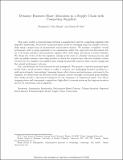| dc.contributor.author | Li, Hongmin | |
| dc.contributor.author | Zhang, Hao | |
| dc.contributor.author | Fine, Charles H. | |
| dc.date.accessioned | 2014-06-06T19:18:19Z | |
| dc.date.available | 2014-06-06T19:18:19Z | |
| dc.date.issued | 2013-04 | |
| dc.date.submitted | 2011-06 | |
| dc.identifier.issn | 0030-364X | |
| dc.identifier.issn | 1526-5463 | |
| dc.identifier.uri | http://hdl.handle.net/1721.1/87687 | |
| dc.description.abstract | This paper studies a repeated game between a manufacturer and two competing suppliers with imperfect monitoring. We present a principal-agent model for managing long-term supplier relationships using a unique form of measurement and incentive scheme. We measure a supplier's overall performance with a rating equivalent to its continuation utility (the expected total discounted utility of its future payoffs), and incentivize supplier effort with larger allocations of future business. We obtain the vector of the two suppliers' ratings as the state of a Markov decision process, and we solve an infinite horizon contracting problem in which the manufacturer allocates business volume between the two suppliers and updates their ratings dynamically based on their current ratings and the current performance outcome.
Our contributions are both theoretical and managerial: we propose a repeated principal-agent model with a novel incentive scheme to tackle a common, but challenging, incentive problem in a multiperiod supply chain setting. Assuming binary effort choices and performance outcomes by the suppliers, we characterize the structure of the optimal contract through a novel fixed-point analysis. Our results provide a theoretical foundation for the emergence of “business-as-usual” (low effort) trapping states and tournament competition (high effort) recurrent states as the long-run incentive drivers for motivating critical suppliers. | en_US |
| dc.language.iso | en_US | |
| dc.publisher | Institute for Operations Research and the Management Sciences (INFORMS) | en_US |
| dc.relation.isversionof | http://dx.doi.org/10.1287/opre.1120.1155 | en_US |
| dc.rights | Creative Commons Attribution-Noncommercial-Share Alike | en_US |
| dc.rights.uri | http://creativecommons.org/licenses/by-nc-sa/4.0/ | en_US |
| dc.source | SSRN | en_US |
| dc.title | Dynamic Business Share Allocation in a Supply Chain with Competing Suppliers | en_US |
| dc.type | Article | en_US |
| dc.identifier.citation | Li, Hongmin, Hao Zhang, and Charles H. Fine. “Dynamic Business Share Allocation in a Supply Chain with Competing Suppliers.” Operations Research 61, no. 2 (April 2013): 280–297. | en_US |
| dc.contributor.department | Sloan School of Management | en_US |
| dc.contributor.mitauthor | Fine, Charles H. | en_US |
| dc.relation.journal | Operations Research | en_US |
| dc.eprint.version | Author's final manuscript | en_US |
| dc.type.uri | http://purl.org/eprint/type/JournalArticle | en_US |
| eprint.status | http://purl.org/eprint/status/PeerReviewed | en_US |
| dspace.orderedauthors | Li, Hongmin; Zhang, Hao; Fine, Charles H. | en_US |
| dc.identifier.orcid | https://orcid.org/0000-0003-3096-9843 | |
| mit.license | OPEN_ACCESS_POLICY | en_US |
| mit.metadata.status | Complete | |
